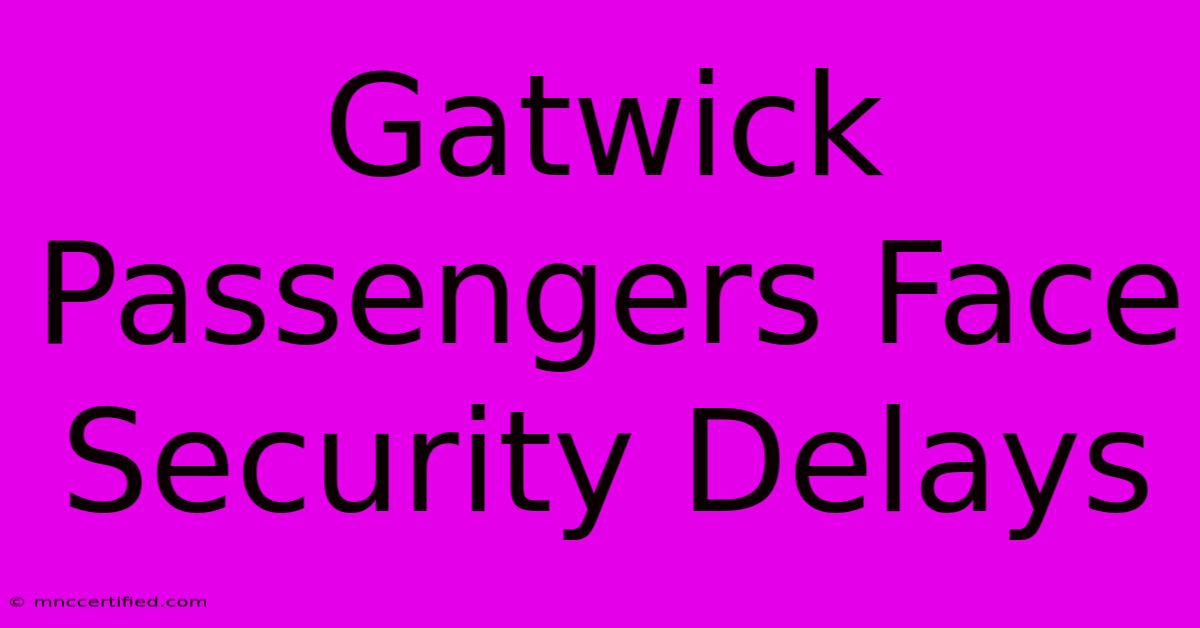Gatwick Passengers Face Security Delays

Table of Contents
Gatwick Passengers Face Security Delays: What You Need to Know
Gatwick Airport, one of the UK's busiest airports, has recently experienced significant security delays, causing frustration and disruption for thousands of passengers. This article will delve into the causes of these delays, offer advice on how to mitigate their impact, and provide an outlook on the situation.
Understanding the Causes of Gatwick Security Delays
Several factors contribute to the prolonged security queues at Gatwick. Identifying these is crucial for both passengers and the airport authorities to implement effective solutions.
Staffing Shortages:
One of the most significant contributing factors is a reported staffing shortage within the airport's security department. This shortage can lead to longer wait times as fewer staff members are available to process passengers efficiently. The impact is amplified during peak travel times, resulting in significantly extended queues. Recruitment and training initiatives are key to addressing this issue.
Increased Passenger Numbers:
Post-pandemic, passenger numbers have surged dramatically at Gatwick, exceeding pre-pandemic levels in many instances. This increased volume of passengers naturally leads to longer processing times at security checkpoints, even with adequate staffing. Improved passenger flow management strategies are needed to cope with the higher volume.
Security Procedures and Technology:
While enhanced security measures are crucial for passenger safety, they can also contribute to slower processing times. Advanced technological solutions are being explored to streamline security checks and reduce bottlenecks. However, the implementation and integration of new technology often require time and careful planning.
Unexpected Disruptions:
Unexpected events, such as technical malfunctions of security equipment or unforeseen staff absences, can further exacerbate delays. Contingency plans and robust backup systems are necessary to minimize the impact of such disruptions.
How to Minimize the Impact of Delays
While the airport authorities work to resolve these issues, passengers can take steps to minimize the disruption caused by security delays:
- Arrive Early: Allow significantly more time than usual to get through security. Gatwick's official website provides real-time information, but it's advisable to add a generous buffer to account for unexpected delays.
- Check the Website: Before heading to the airport, check the Gatwick Airport website for up-to-date information on security queue times and any potential disruptions.
- Prepare Your Baggage: Ensure you are familiar with permitted items and pack accordingly to avoid delays caused by prohibited items. Organize your belongings to facilitate quick and efficient screening.
- Consider Priority Security: If available and within your budget, consider purchasing priority security access to bypass standard queues.
- Stay Hydrated and Informed: Bring water and snacks to alleviate discomfort while waiting in line, and remain updated on any official announcements.
Looking Ahead: Improvements and Solutions
Gatwick Airport is actively working to alleviate these delays. Their strategies include:
- Increased Recruitment: Investing in recruiting and training more security personnel.
- Technological Upgrades: Implementing new technologies to speed up the security process.
- Improved Passenger Flow Management: Optimizing passenger flow through the airport to minimize bottlenecks.
- Enhanced Communication: Providing real-time updates and clear communication to passengers.
The situation is constantly evolving, and ongoing efforts are being made to improve the passenger experience. Staying informed through official channels is vital for travelers planning to use Gatwick Airport.
Keywords:
Gatwick Airport, security delays, airport security, Gatwick passengers, travel delays, UK airports, airport queues, security staffing, passenger numbers, airport technology, priority security, travel advice, Gatwick Airport news, airport disruption.
(Note: This article is optimized for SEO. The keywords are integrated naturally within the text. Remember to conduct further keyword research and analysis to tailor the content to the most relevant and competitive keywords for your target audience.)

Thank you for visiting our website wich cover about Gatwick Passengers Face Security Delays. We hope the information provided has been useful to you. Feel free to contact us if you have any questions or need further assistance. See you next time and dont miss to bookmark.
Featured Posts
-
James Injury Latest Chelsea News
Nov 23, 2024
-
Bumrah Runs In India Australia Test
Nov 23, 2024
-
Shortest Meets Tallest Woman
Nov 23, 2024
-
Trump Ag Pick Msnbc Guest Flummoxed
Nov 23, 2024
-
Civil Rape Case Against Mc Gregor
Nov 23, 2024